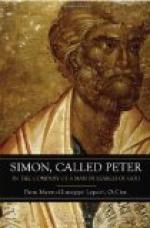It was a few days later that Louise took Peter to church. His ignorance of her religion greatly amused her, or so at least she pretended, and when he asked her to come out of town to lunch one morning, and she refused because it was Corpus Christi, and she wanted to go to the sung Mass, it was he who suggested that he should go with her. She looked at him queerly a moment, and then agreed. They met outside the church and went in together, as strange a pair as ever the meshes of that ancient net which gathers of all kinds had ever drawn towards the shore.
Louise led him to a central seat, and found the place for him in her Prayer-Book. The building was full, and Peter glanced about him curiously. The detachment of the worshippers impressed him immensely. There did not appear to be any proscribed procedure among them, and even when the Mass began he was one of the few who stood and knelt as the rubrics of the service directed. Louise made no attempt to do so. For the most part she knelt, and her beads trickled ceaselessly through her fingers.
Peter was, if anything, bored by the Mass, though he would not admit it to himself. It struck him as being a ratherly poorly played performance. True, the officiating ministers moved and spoke with a calm regularity which impressed him, familiar as he was with clergymen who gave out hymns and notices, and with his own solicitude at home that the singing should go well or that the choirboys should not fidget. But there was a terrible confusion with chairs, and a hideous kind of clapper that was used, apparently, to warn the boys to sit and rise. The service, moreover, as a reverential congregational act of worship such as he was used to hope for, was marred by innumerable collections, and especially by the old woman who came round even during the Sanctus to collect the rent of the chairs they occupied, and changed money or announced prices with all the zest of the market-place.
But at the close there was a procession which is worth considerable description. Six men with censers of silver lined up before the high altar, and stood there, slowly swinging the fragrant bowls at the end of their long chains. The music died down. One could hear the rhythmical, faint clangour of the metal. And then, intensely sudden, away in the west gallery, but almost as if from the battlements of heaven, pealed out silver trumpets in a fanfare. The censers flew high in time with it, and the sweet clouds of smoke, caught by the coloured sunlight of the rich painted windows, unfolded in the air of the sanctuary. Lights moved and danced, and the space before the altar filled with the white of the men and boys who should move in the procession. Again and again those trumpets rang out, and hardly had the last echoes died away than the organ thundered the Pange Lingua, as a priest in cloth of gold turned from the altar with the glittering monstrance in his hand. Even from where he stood Peter could see the white centre of the Host for Whom all this was enacted. Then the canopy, borne by four French laymen in frock-coats and white gloves, hid It from his sight; and the high gold cross, and its attendant tapers, swung round a great buttress into view.




